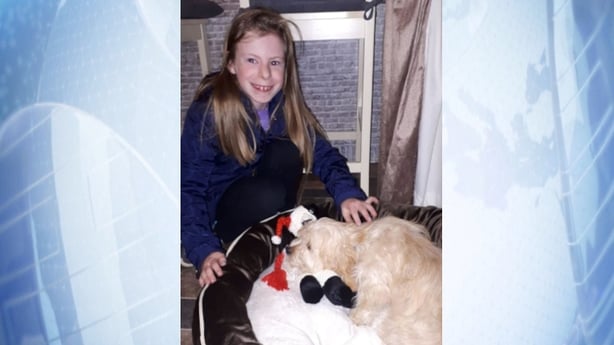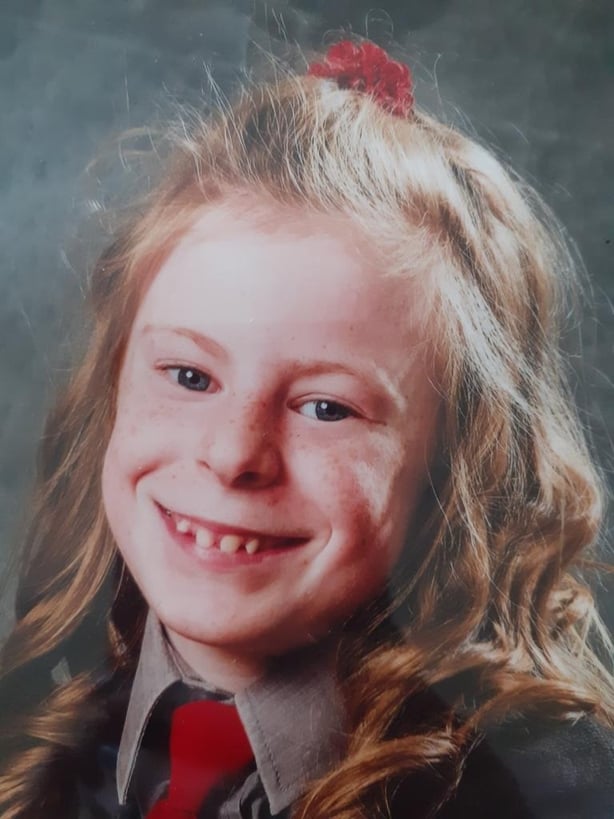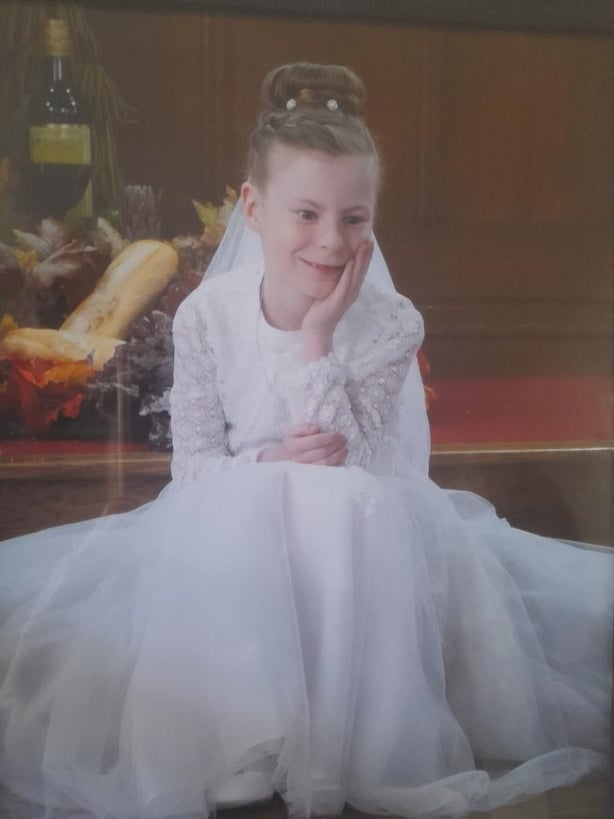The parents of a 10-year-old Cork girl who died as a result of a serious Strep-A infection have urged other parents to make themselves aware of the seriousness of the illness.
Vivienne Murphy, from Millstreet in Co Cork, died on 1 March 2019, just two weeks after complaining of a sore throat.
Her parents recounted the harrowing story of her death in an interview on RTÉ's This Week programme.
Valentine's Day
The nightmare for the Murphy family began on St Valentine's Day 2019.
Dermot Murphy collected his daughter Vivienne from school. She was more subdued than usual, had less energy, and decided to sit on the couch watching cartoons on television instead of going back with her father to collect her older brother Steven from secondary school.
Later that evening, she started complaining of being unwell and having a sore throat.
Vivienne's parents, Dermot and Lilly, had to attend a funeral that evening and visited Vivienne's grandmother nearby, but their son Steven, who was minding his sister, contacted them by phone to tell them something was wrong.
"He said Vivienne isn't well, she really is not well, you need to come home," said Vivienne's mother Lilly.

When they arrived home they found she had a high temperature, but there was something else more concerning, a rash on her body.
"We both got a bit of a shock," said Vivienne’s father Dermot. "When we opened her shirt and took off her school clothes, we saw this rash."
They immediately took her to the out-of-hours GP service where a doctor told them she believed that Vivienne had a viral illness.
After two days of giving their daughter paracetamol and ibuprofen, her fever continued to rage, and Vivienne's parents decided to return to the out-of-hours doctor for further advice.
Doctor visits
"We explained that we couldn't keep her temperature down and that the rash was spreading, and she was really agitated."
The second doctor they saw told them she also believed Vivienne had a viral illness, but asked for a urine sample, which Vivienne was unable to provide.

They were advised to visit their own GP and to bring a urine sample if they could.
By Monday, Vivienne's condition had not improved and she was brought to the family's GP, who told them she too considered their daughter's illness to be viral.
"I had to ask my son to drive us down because at that stage Vivienne couldn't walk," Lilly Murphy said.
"She was in pain, she was miserable."
Despite being told by three different doctors that their daughter's illness was viral, the Murphys still had their doubts.
"We said it can't be, there must be something else, it's been going on for days," said Lilly.
The doctor told them to bring a urine sample back to her if they could get one.
Later that day, Vivienne provided a small sample, which Dermot brought to the GP who tested it, but did not find anything concerning.
Worsening condition
After five days, and having seen three different doctors, Vivienne's condition deteriorated further.
"We realised she was still getting worse, and the rash was really angry looking. By the evening she had pain and we noticed that her right leg started swelling at the knee," said her father Dermot.
They called the out-of-hours GP service again.
"We were panicking now, and spoke to the doctor we had spoken to originally and told her our child was getting worse not better."
"We were told this could still be a flu virus, and we explained about the knee, and said the child couldn’t stand at all."
The doctor told the Murphys that they could bring their daughter to the emergency department if they were not happy later that night or in the morning.
"Later on that night we carried her up the stairs to her little room, and the two of us were in the room with her and she was just miserable, and we said there something not right let's just go," said Lilly.
Her father Dermot carried her down the stairs and put his daughter in the car, and headed for Cork University Hospital (CUH) at high speed.
We need your consent to load this rte-player contentWe use rte-player to manage extra content that can set cookies on your device and collect data about your activity. Please review their details and accept them to load the content.Manage Preferences
The black mark
They arrived at the hospital around 1am and were taken to a side room off the main emergency department.
As she was being examined by a nurse at the Emergency Department Lilly Murphy noticed something unusual.
"We took off her pyjamas and we saw a little black mark on her right leg."
"The nurse said, 'What's that?'" And we said: "We don't know," Lilly recalls.
"She went into a panic mode, and called the doctor who came and asked us if she had fallen, and we said 'no.'"
Lilly said the medical team at CUH carried out a blood test on Vivienne, and when the results returned "all hell broke loose".
"They were showing us numbers, and we were looking at the nurse, and the nurse said 'your daughter is critically ill'."
Dermot noticed that the black mark on Vivienne's leg was getting bigger.
"The doctor marked it with a skin marker, but we could see it was growing outside the mark."
"We [were told] at that stage the black mark meant that Vivienne had sepsis and was going into shock," said Lilly, who wanted the doctors to operate on their daughter to stop the infection.
The black mark indicated the presence of a disease called necrotising fasciitis, a rare bacterial infection that spreads quickly through the body, which can cause death.
It is sometimes referred to as the 'flesh-eating disease'.
Dermot Murphy said: "We knew then that something really bad was going on, the black mark was moving up her body."
"Lilly asked the doctors if they had a surgeon on standby, and they said yes, and Lilly said 'what are you waiting for? Please operate!'"
The Murphys were prepared for doctors to amputate their daughter's leg if it meant her life could be saved, but they were told that surgery could not be done in Cork because there was no Paediatric Critical Care Unit at Cork University Hospital to care for her after surgery.
They were told Vivienne would have to be taken to Temple Street in Dublin for an operation.
"That took hours. We had to wait for an ambulance to come from Dublin with specialists to look after her. It took ages," said Lilly.
Vivienne's last words
As Vivienne's condition deteriorated, doctors decided to put her under anaesthetic.
Lilly and Dermot recall the final words she spoke before she was made unconscious.
"She said 'thank you, nurse, I'm sorry for crying. I know you're only trying to help me'," said Dermot.
"That was the dignity she had. They were her last words on this planet. She had so much empathy. The world is a sadder place without her."

Vivienne was transferred to Temple Street in a specialist ambulance. Her parents had to travel separately by car.
On the road, they received a phone call from the medical team who told the Murphys that if Vivienne had any chance of survival they would have to operate, and they asked if they could have permission.
"I said go ahead, just take care of her," said Lilly.
At Temple Street, they waited for news of her surgery.
Dermot explained that the surgeon met them at about 11pm that night and told them what happened.
"The words he told us were shocking."
"He said I think I have stopped the disease from spreading, but I had to cut away 17% of your daughter's body."
"When I heard 17%... I thought when we were in Cork we would probably have got away with 1%, the black mark, cut it out there."
"17% is burned into my brain."
"The disease had gone where we thought it would go, it had gone up her leg, onto her buttocks, across her abdomen, and it had slowly started creeping down her left leg."
The Murphys said the black mark started out as Strep A, which led to sepsis, which led to shock, and that led to necrotising fasciitis.
Cardiac arrest
The day after the operation, things changed again for Vivienne.
The extent of the surgery, and the disease she had battled caused her heart to stop beating, and she went into cardiac arrest.
"There was an alert put out for us to come quickly to her bedside," said Dermot.
"We ran into the room. There were six or seven nurses there, doctors, professors. The head professor was in there, and they were trying to bring her back, and they're pumping and pushing and trying hard to save Vivienne and he was really going hard."
"At one stage he turned to Lilly and me, and said: 'Parents scream at your daughter, call her back! Call her back! Bring her back!'"
"And Lilly started screaming, please come back to us, please come back to us, and it went back a long time, and he said 'call her - she will know your voice'."
"And she did come back to us. And we thought wow - we have her."
But the next day there was more news.
Because of the cardiac arrest, Vivienne suffered brain damage.
"There was no oxygen to the brain, she had been out too long," said Dermot.
Vivienne's medical team decided to put her through an MRI scan to determine the extent of the brain damage.
"It was the longest night of our lives," said Lilly.
"Then they told us that she was brain dead, and there was no hope."
Ending life support
Vivienne's father Dermot compares the discussion about the next steps for his daughter as like being in a torture chamber.
"We were taken into a room, the surgeon would come, a couple of more doctors would come, maybe a nurse and they'd break more bad news to us."
"There was bad news every day."
Lilly said the decision to end Vivienne's life support was made because they wanted to protect her dignity.
But the final moments of Vivienne's life were among the most distressing they experienced.

"We were told that because of everything she'd been through, she would slip away quietly and quickly, but that didn't happen," said Lilly.
Dermot said it was a horrendous time.
"The poor little thing kept fighting, it was 35 or 40 minutes, and even then, she came back again."
"It was torture, on top of torture, on top of torture," he said.
"It was shocking, one day we are begging her to stay alive, the next day we are begging her to die."
"I had to watch my wife lie into that bed, she held her little daughter that was so precious to her, and we are shouting at her to die.
"I want people to know how dangerous Strep A is," he said.
"You don't want to be lying in the bed, holding your child's head a week later, begging her to die."
Raising awareness
Vivienne died on 1 March 2019.
Since she passed, her parents said they experience the lowest depths of despair every day.
"Even four years later time hasn't dented the pain. When we found out what it was, how curable it was, and we were asked to swallow that bitter pill, that is the problem for me, it was such an easy thing to cure with antibiotics. Tha'’s what we are struggling with, and probably will keep struggling with."
Lilly suffers because she believes there could have been a different outcome.
"I am trying to get past the horror because I have two other children. We have to be strong for them."
The Murphys want to make people aware of the dangers of Strep-A.
"If your child has a fever, or a rash, be vigilant, these things can change so quickly. Our daughter started off with signs and symptoms and within ten days she was gone."
"We are just begging and pleading that parents look out for these things, don’t be submissive, and don’t ever think that you are being an overreacting parent, because you are not."
Dermot Murphy said he wants updated advice provided to doctors.

"If this saves one child, then we will sleep better."
The Murphy family have also raised concerns about the lack of intensive care facilities for children outside of Dublin.
"Cork is a big hospital, and we don't have the intensive care facilities for children here, it doesn't make sense," said Lilly Murphy.
"If Vivienne's story could only save one child, that's a plus," she added.
The Dublin City Coroner Dr Cróna Gallagher told RTÉ’s This Week programme that she intends to write to the HSE, the Department of Health and the Irish College of General Practitioners to bring Vivienne Murphy's case to their attention regarding awareness about Group A Strep.
She said she will also raise awareness of the absence of a paediatric Intensive Care Unit in Cork - which necessitated Vivienne's transfer to another hospital for surgery.
In a statement, the HSE said that it wanted to express its deepest sympathy to the Murphy family for the loss of Vivienne but that it could not comment on any individual case.
It confirmed that it had sent updated guidance, and antibiotics updates on invasive Group Strep to doctors since an upsurge of cases in October of last year.
It also confirmed that the only two Paediatric Critical Care units in Ireland are based in Dublin.
The HSE said that children requiring paediatric intensive care are transported via a service which operates only from the hours of 8am to 8pm seven days a week.
It said there are plans to have this service available 24 hours a day.
HSE guidance on Strep A outlines that it is a common bacteria, sometimes found in the throat or on the skin without causing any symptoms.
It usually causes mild illness, like sore throats and skin infections.
Cases of Strep which cause a severe and life-threatening illness, called invasive group A streptococcal disease, are rare.
The advice from the HSE states that antibiotics are not usually needed if you have a sore throat or high temperature, but your GP may prescribe antibiotics if they think that you have Strep A.







